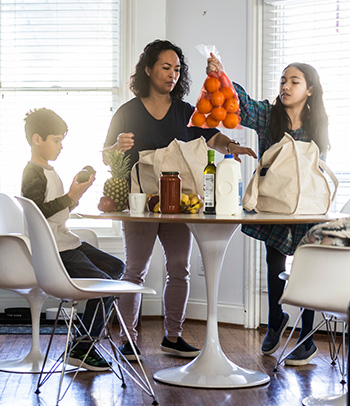With the right resources and support, you can work to manage your PTSD and build a loving and nurturing relationship with your children at the same time.
Parenting, even in the best of times, is not an easy job. No one sends you to boot camp or training to figure out how to raise your kids, and what you learn with one kid doesn’t always work with the next one. It can be difficult for any parent to figure out the best ways to communicate with, discipline, love and nurture their children.
If you’re a parent living with post-traumatic stress disorder (PTSD), you may find yourself struggling when it comes to parenting and maintaining a strong relationship with your children. Maybe you struggle with angry outbursts or find yourself wanting to withdraw and be left alone. Maybe you struggle with loud noises or big crowds, making it difficult to cheer on your kids at big events. Or maybe you have difficulty concentrating or focusing for long periods of time to help with things like school projects or homework.
With the right resources and support, you can work to manage your PTSD and build a loving and nurturing relationship with your children at the same time. Check out the tips and resources below to get the support you and your children deserve.
Tips for Navigating Parenthood With PTSD
You and your family are unique, and what works well for some families may or may not work well for yours. You know your family best. You know your strengths and what you may need support with. The Department of Veterans Affairs (VA) has several parenting tips and resources for Veterans managing PTSD.
Read through these tips and resources and take what you think may work well for you and your family.
- Manage your PTSD. If you’ve been diagnosed with PTSD, you and your health care provider have developed a plan for you to manage your PTSD, and it’s important to follow it. If you have therapy appointments scheduled, keep them. If you’re prescribed medication, take it regularly. The more you work on your PTSD, the more control you’ll have over your symptoms and their impact on you and your family. If you haven’t started a treatment plan, VA provides PTSD treatment options.
- Learn more. Maybe you haven’t spent much time thinking about how your PTSD may impact the people around you, including your children. The more you learn about PTSD and parenting, the better equipped you’ll be to manage things. The National Center for PTSD explains how your PTSD symptoms may impact you and your children. You can also hear stories and tips from other Veterans with PTSD in the online course Parenting for Veterans.
- Take care of yourself. Everything is harder when you’re tired and not feeling your best. Make sure to give your body and mind time to recharge. Aim for 7-9 hours of sleep a night, eat nutritious foods and move your body every day. These habits can help reduce stress, anxiety and feelings of depression and improve your overall health. If you’re struggling with nightmares or insomnia, read about sleep disorders that impact Veterans and get the support you need.
- Figure out the best ways to show up for your children. Your PTSD symptoms may impact certain aspects of your parenting, but you still have a ton of great things to offer. Ask yourself – What can I do well? How can I show up for my kids? For example, maybe you don’t like large crowds, so you’ve been avoiding your child’s sporting events. But could you stand far away from the crowds or wear headphones? Could you take your child out for ice cream and hear about the game one-on-one instead? Maybe you have a hard time concentrating, so you avoid helping with homework. Can you do break time instead? Maybe you could play a game of catch after homework is done or play a video game together as a reward for finishing it. If you struggle with communication, maybe you could try texting or leaving little notes for your kids? Use what you can do well to create a stronger relationship with your children.
- Talk to your children about your PTSD. Depending on your children’s ages or maturity levels, consider talking to them about certain aspects of your PTSD. Think about what might be helpful for them to know, such as how your PTSD impacts you, what some of your triggers are or how they can help. When you explain what you’re going through, it may help them understand more about you and your relationship. For example, it isn’t that you don’t care enough to go to a soccer game, it’s that you struggle in a crowd. It isn’t that you’re irritated with them all the time, it’s that you have trouble sleeping and may react with anger or irritation after a bad night’s sleep. Even just letting them know you’re working on yourself can be helpful. The booklet A Veteran’s Guide to Talking With Kids About PTSD can help you get started.
- Apologize. We all make mistakes. We wish we hadn’t lost our temper or that a conversation had gone differently. When you make a mistake, own up to it and apologize. Explain why you’re sorry or even why you reacted the way you did. This honesty and openness can help you and your kids develop better communication skills and build a better relationship.

- Create family rituals and routines that are safe and comforting for everyone. Routines and structure can help make things predictable, especially when your family is going through changes. It’s helpful to know that certain things stay the same, even if it’s just small things like what time you go to bed or wake up each day. Creating family rituals can help bring you closer. Try a family walk one night a week or a family movie night over the weekend.
- Offer your children resources and support. You don’t have to have all the answers. You can use the support and resources around you to help your children thrive. Consider getting your children involved in activities outside of the home where they can build strong connections with others. Blue Star Families has a lot of ways to get involved and meet other military and Veteran-connected families in your area. Sesame Street for Military Families offers online games, printable worksheets, mobile apps and much more to help support your children through difficult times.
- Pay attention to signs your children may be struggling. Even with all your hard work, your children may still struggle. Read about potential warning signs, including withdrawing, losing interest in normal activities, angry outbursts and more. The article also includes resources to help you navigate what to do when your children are struggling.
- Build coping skills together. You may find that sharing your coping skills with your children is beneficial for all of you. Children don’t always have effective ways to manage stress, so you can provide tools and skills that can help. Try doing a short meditation session together, sign up for a yoga class or teach your children a deep breathing technique you can do together. Check out VA’s PTSD Family Coach, a mobile app that provides tips and information that may help you and your family cope.
- Dedicate a few minutes of each day to build and strengthen your relationship. No matter what has happened in the past or where your relationship stands now, every day is a new opportunity to try to make a connection. Even if it’s just a few minutes a day, ask yourself how you can show your children love or appreciation. If you have older kids, maybe it’s a quick text message during the day. If you have young children, a simple hug or a big smile when they wake up can go a long way.
- Get the support you deserve. You don’t have to figure everything out on your own. If you’re struggling with PTSD or feel like you and your family are being impacted by your Service, reach out for help. VA has several mental health treatment options to help you and your family rebuild your relationships, including both individual and family counseling. Look through the resources listed below for additional ways to help you become the best parent for your children.
Additional Resources
- VA’s Veteran Parenting Toolkit offers age-appropriate parenting materials on a wide range of topics including managing behavioral challenges, talking to your children about PTSD, reconnecting with your children and more.
- VA’s Don’t Wait Reach Out site offers a self-assessment tool for PTSD, as well as information and resources on helpful topics like relationship challenges, substance use issues and more.
- VA’s PTSD Bytes series includes a podcast about parenting with PTSD. Hear expert tips and advice on talking to your children about PTSD.
- Elizabeth Dole Foundation’s Hidden Helpers Program is designed for children, youth and young adults who are impacted or involved in the mental, emotional or physical care of a wounded, ill or aging Service member or Veteran.
- The National Center for PTSD has several resources designed for families who are dealing with a loved one’s PTSD. Learn more about the effects of PTSD on families, strategies to cope and resources that can help.
- Make the Connection is full of stories and videos from Veterans just like you who are working on building, rebuilding and strengthening their family relationships.
Your PTSD doesn’t have to control your relationship with your children. Use the resources and support you deserve to build and sustain a strong and loving relationship with your children for years to come.







